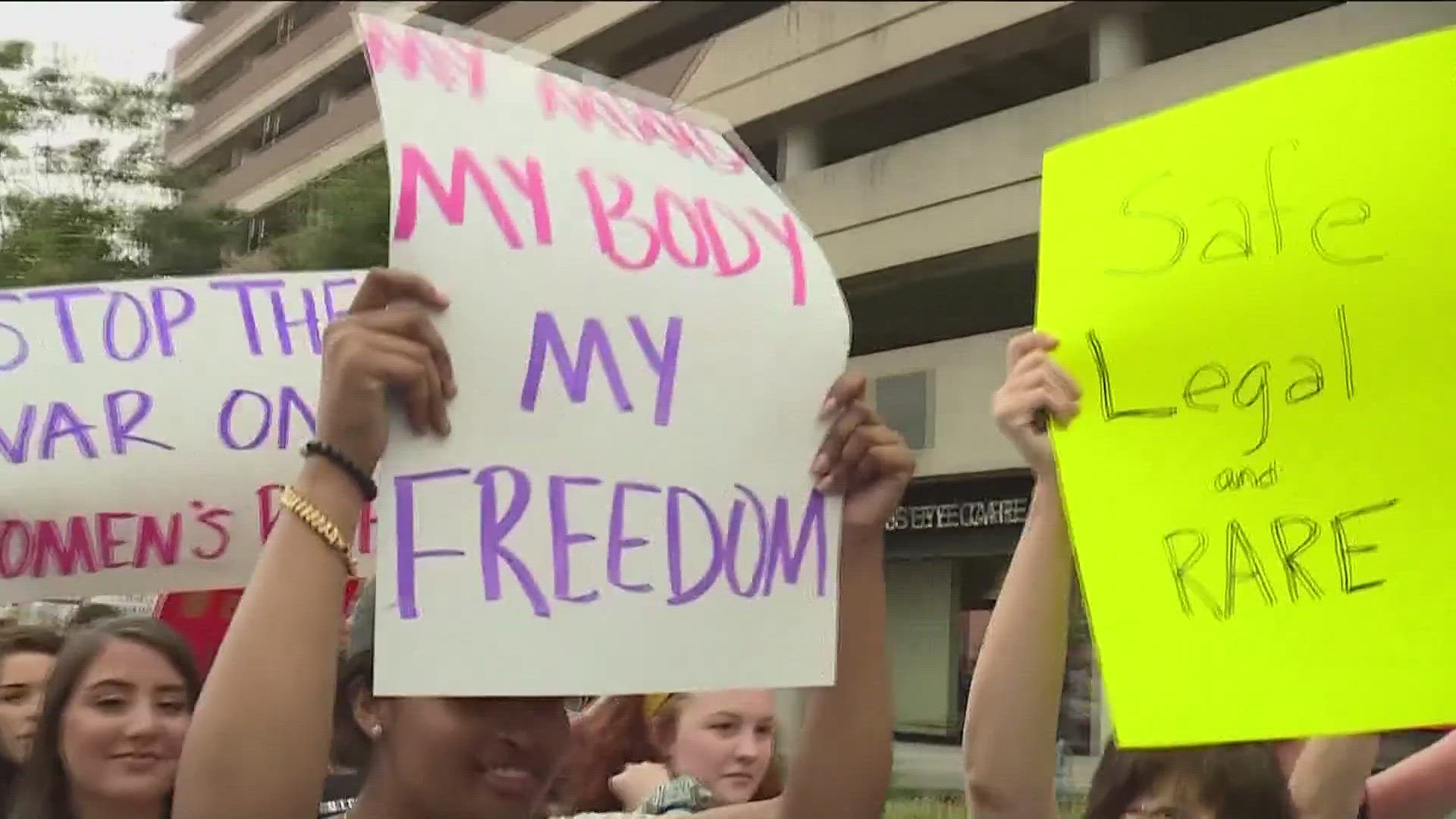ATLANTA — Kwajelyn Jackson listed her concerns in front of media outside the Nathan Deal Judicial Center Tuesday, following oral arguments at the State Supreme Court over Georgia's abortion law.
Jackson is the executive director of the Feminist Women's Health Center, an Atlanta clinic that offers abortion, gynecological, reproductive care and services. The LIFE Act went into effect last summer after the Supreme Court of the United States overruled Roe v. Wade.
"We continue to have to turn away numerous patients every day, who are in life-threatening and life-changing situations,” Jackson said. "Our staff continues to work under the constraints of this law and try to provide as much compassion and care for the people coming into our center, who are dealing with complicated issues beyond just the pregnancy they’re facing right in that moment.”
Jackson said she feared for the lack of options the unemployed, uninsured, housing insecure, and victims of violence face.
"The ways state legislators continue to interfere with our ability to honor the needs of our patients and to act on their behalf to make sure they have access to their full wellness is deplorable, cruel and unconscionable," Jackson said.
Georgia's Supreme Court justices heard arguments from both sides on whether the legislation known as Georgia's "heartbeat law" was void from the beginning when it was signed by Governor Brian Kemp in 2019, while Roe was still in effect.
"It's based on a provision of the Georgia Constitution that bars the legislature from enacting laws that violate either the state or federal constitution at the moment of their enactment," Defense attorney for Sistersong Women of Color Reproductive Collective Julia Stone said."Had this court case been brought in 2019, this court would have had no choice but to strike it down as void. Voidness is not something that can change over time."
Solicitor General Stephen Petrany argued on behalf of the State of Georgia before the State Supreme Court.
"There is no authority for this theory anywhere, and I think this court should avoid going down this road that would really exalt this court above its coordinate branches and say our decisions bind you," Petrany said.
State Sen. Ed Setzler (R-Acworth) originally authored Georgia's abortion law, which bans abortions after six weeks. A judge in Georgia overturned the LIFE Act law in November, ruling it was unconstitutional when it passed. The law has been tied up in the judicial process for the last few months.
"This was not just something thrown together," Setzler said. "This was carefully planned out, carefully thought through in terms of implementation. I think the LIFE Act does such a good job of balancing those difficult circumstances women find themselves in with a basic right to life of a child. I think the court is going to find this is fully constitutional. I think it’s going to be implemented in full.”
Monica Simpson is the executive director of SisterSong, one of the groups suing the state over the abortion ban. She said she sensed a disconnect in court among the justices. She argued Georgia's abortion ban disproportionally affects people of color, along with low-income communities and LGBTQ communities.
"For Georgians to be able to make their own decisions about their bodies, families and futures, that’s the work we’re rooted in," Simpson said. "This abortion ban has forced Georgians to travel across state lines, to seek essential healthcare at great expense, or to continue their pregnancies against their will.”
Georgia State University law professor Anthony Michael Kreis said Tuesday's hearing will only mark one stop in the long judicial journey ahead. He expects the law could go back to Superior Court for a ruling before the State Supreme Court has a final say.
“It’s really a philosophical debate about what the law meant and when, and that’s a harder case to make than to make the case for whether or not abortion is protected as a fundamental right under the state constitution," Kreis said. “The courts will have to really answer, at the end of the day, whether or not there’s a fundamental right to abortion in the state constitution. There’s really no way the court’s getting around that. It’s just a matter of whether or not the legislature would have to adopt a new abortion law or whether we were going to challenge that under the current law in place.”
A ruling is expected from the Georgia Supreme Court on this case within the next six months. Advocates want the law to be declared void, requiring the legislature to draw up a new law now that Roe has been overturned.
“I’m tired of all the ways we’ve had to prove our community, the ways we’ve had to fight for our dignity to ensure that our community has the things they need," Jackson said. "Every time we turn someone away, we’re complicating their lives even further. Their already complex lives are being more damaged when they’re disappointed and heartbroken because they can’t get care where they live.”

